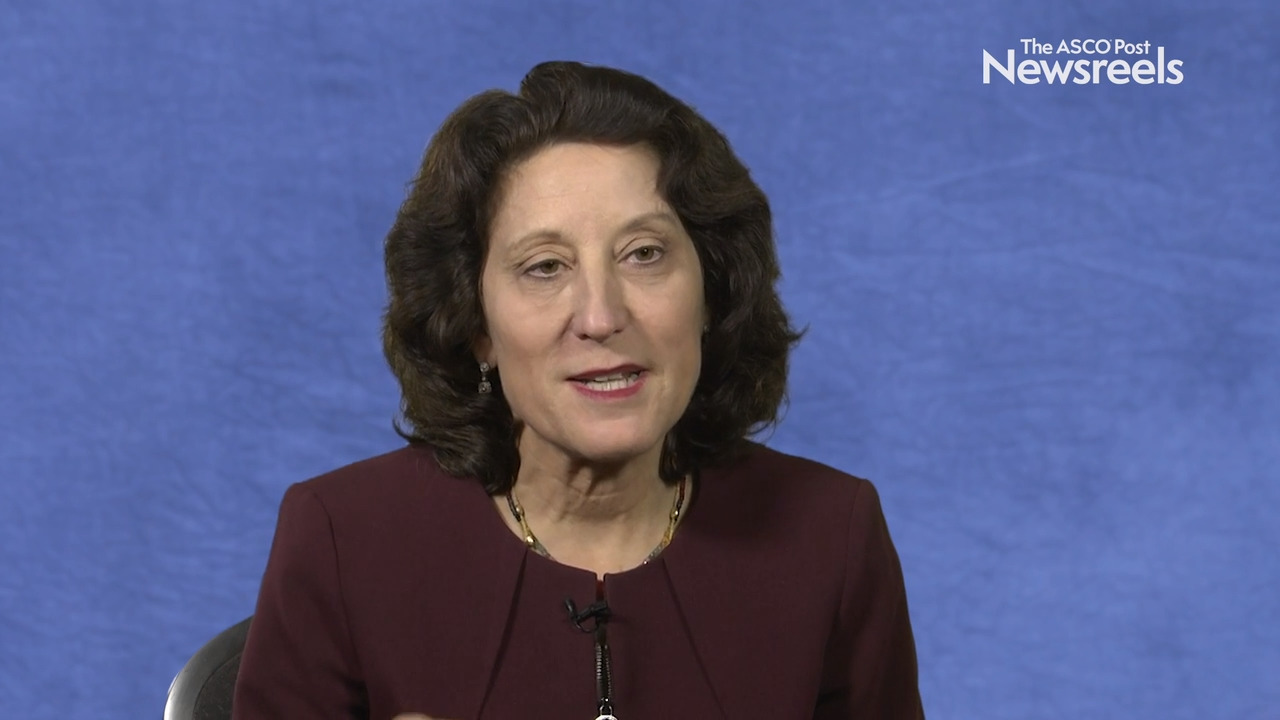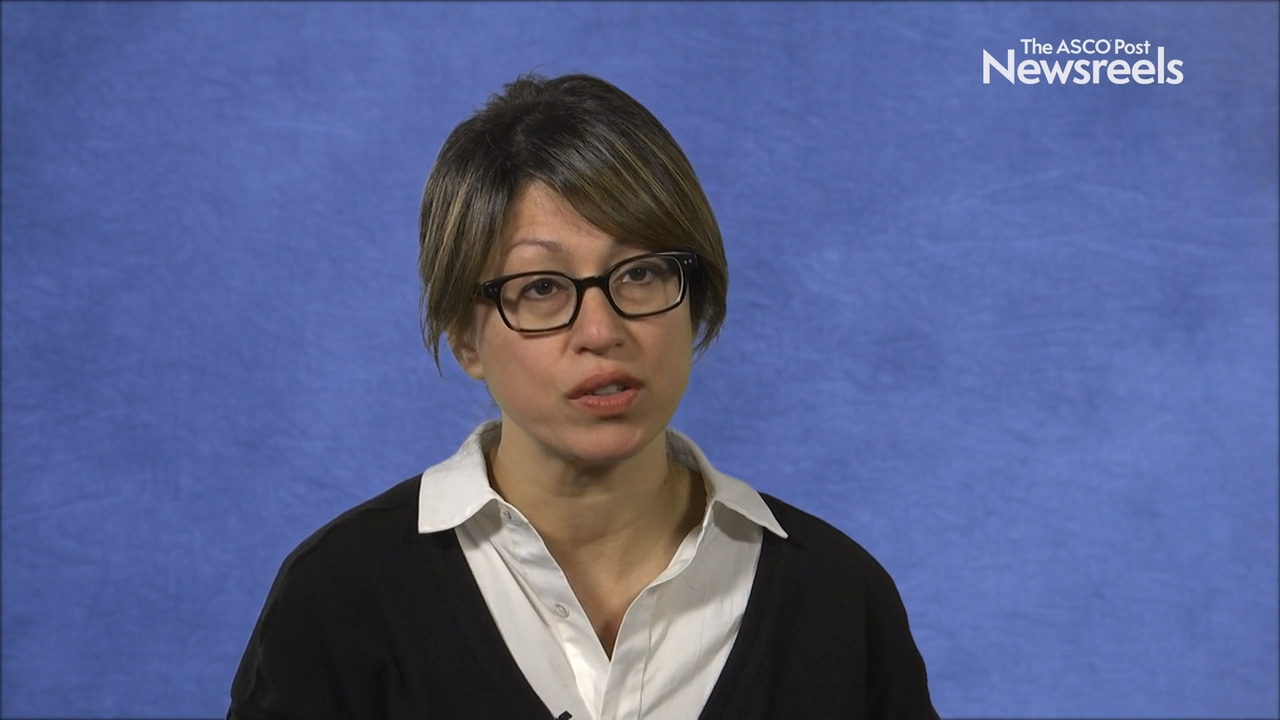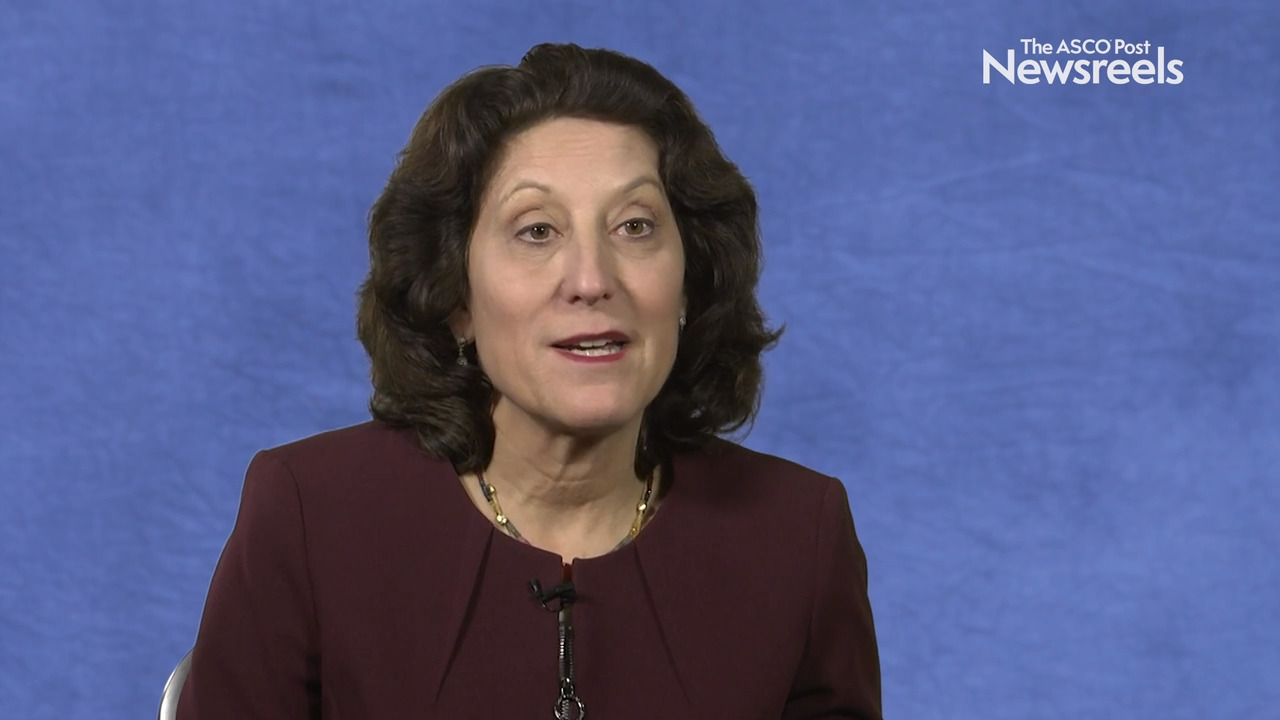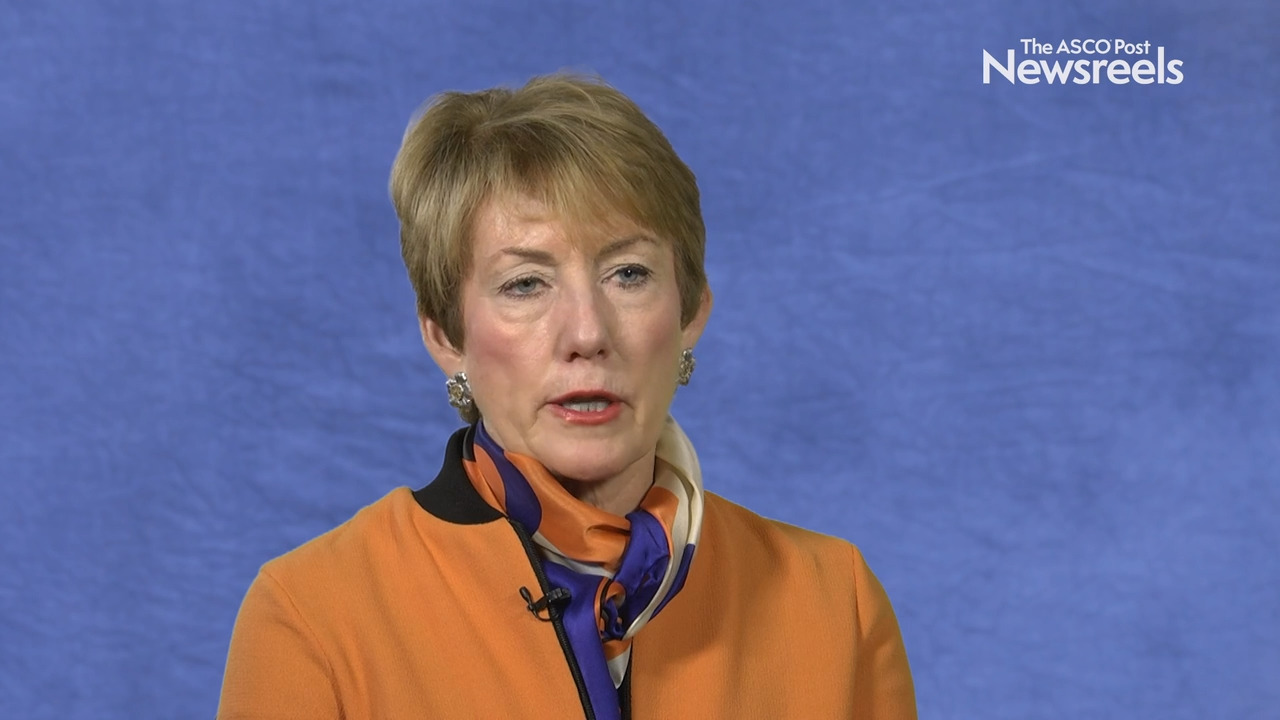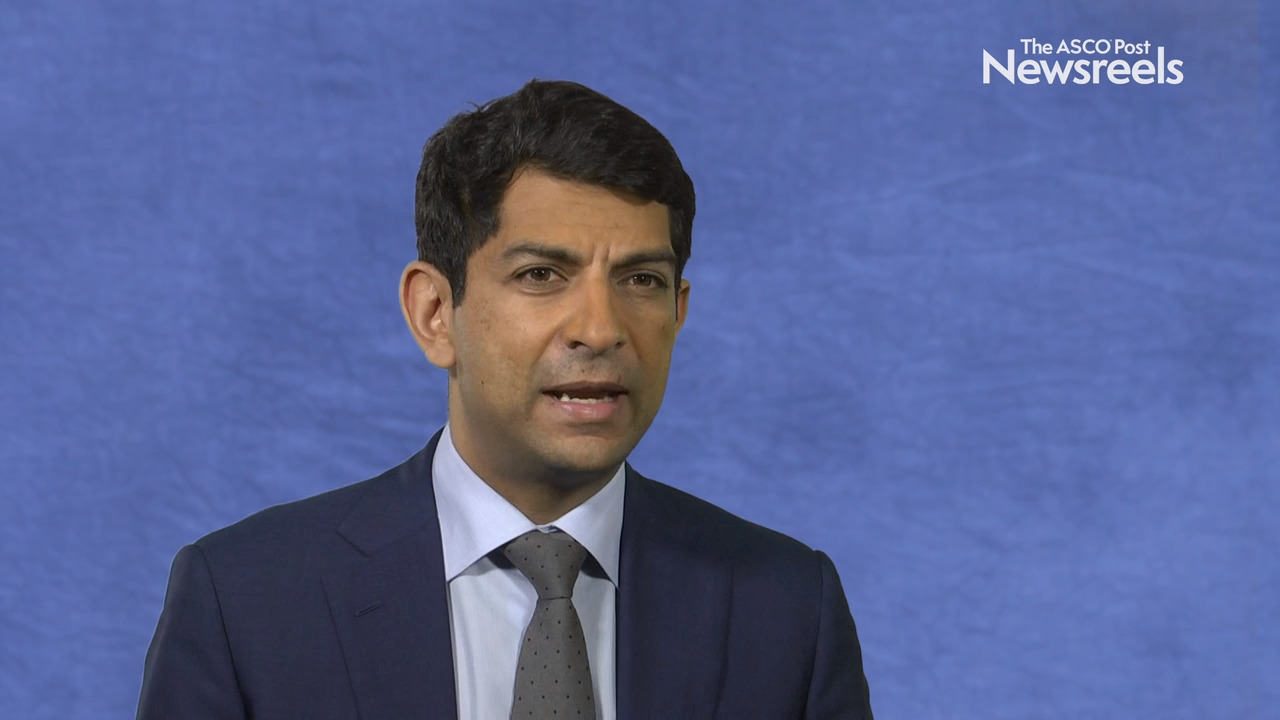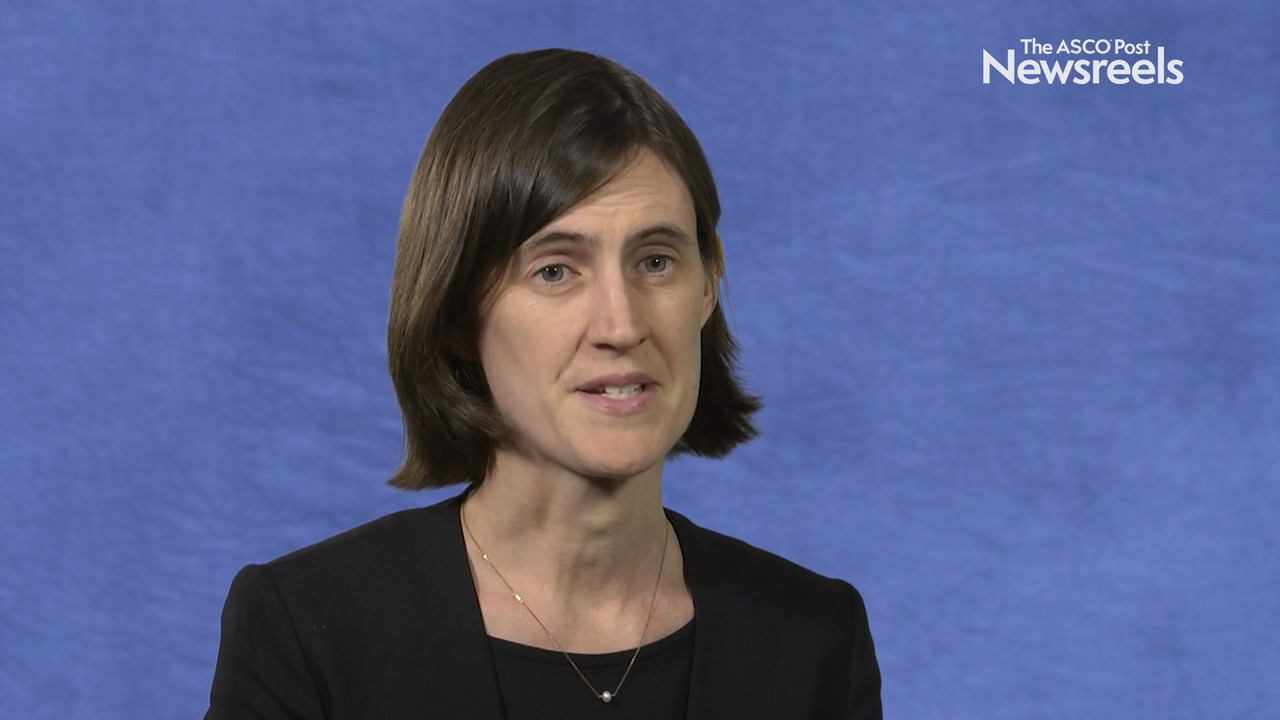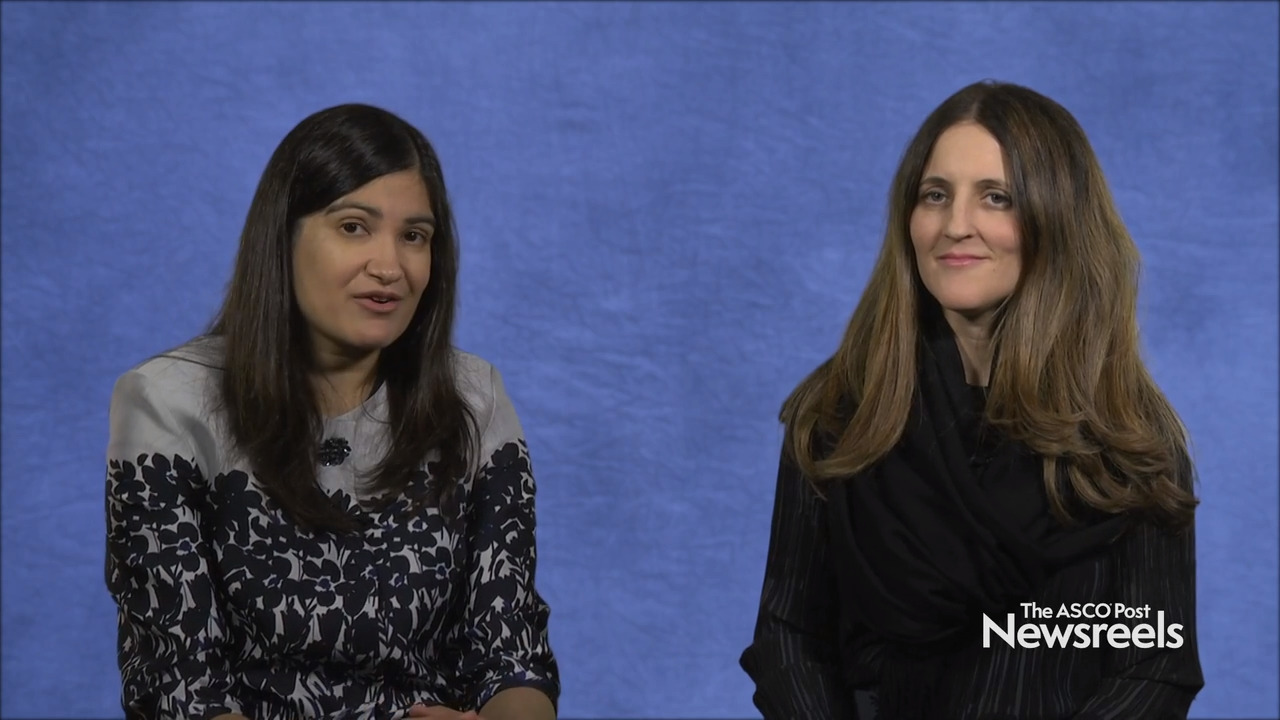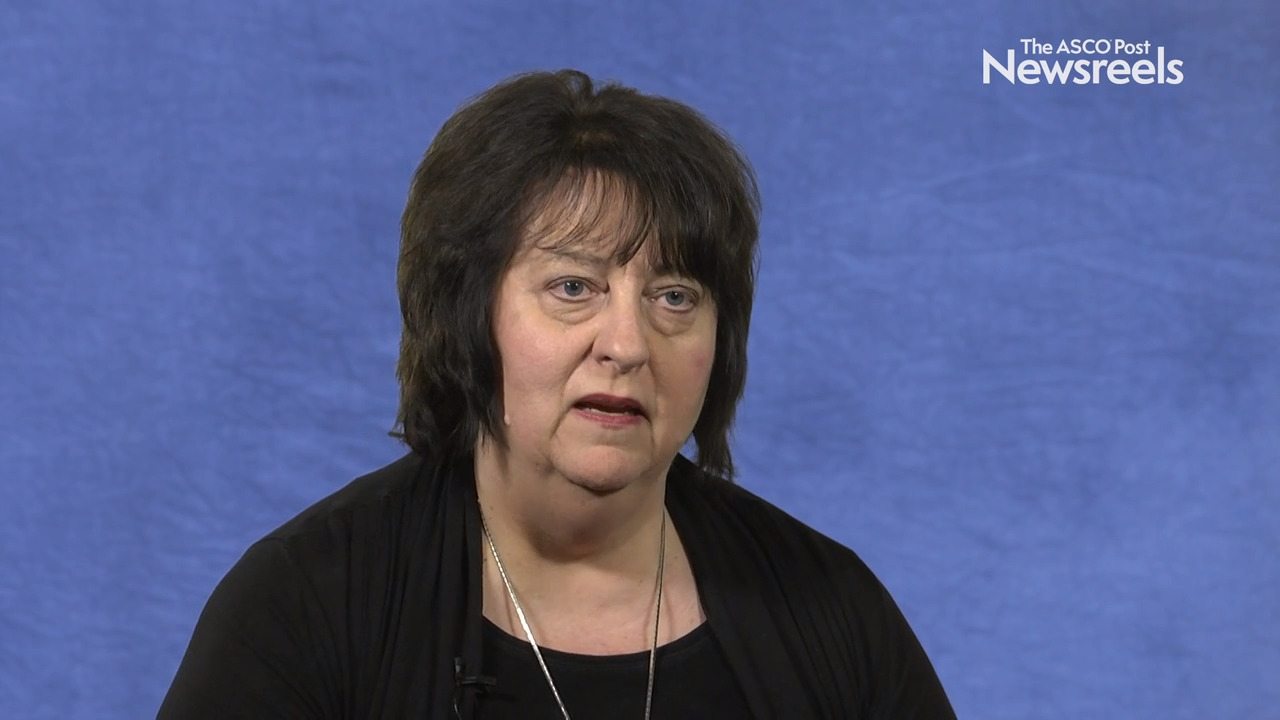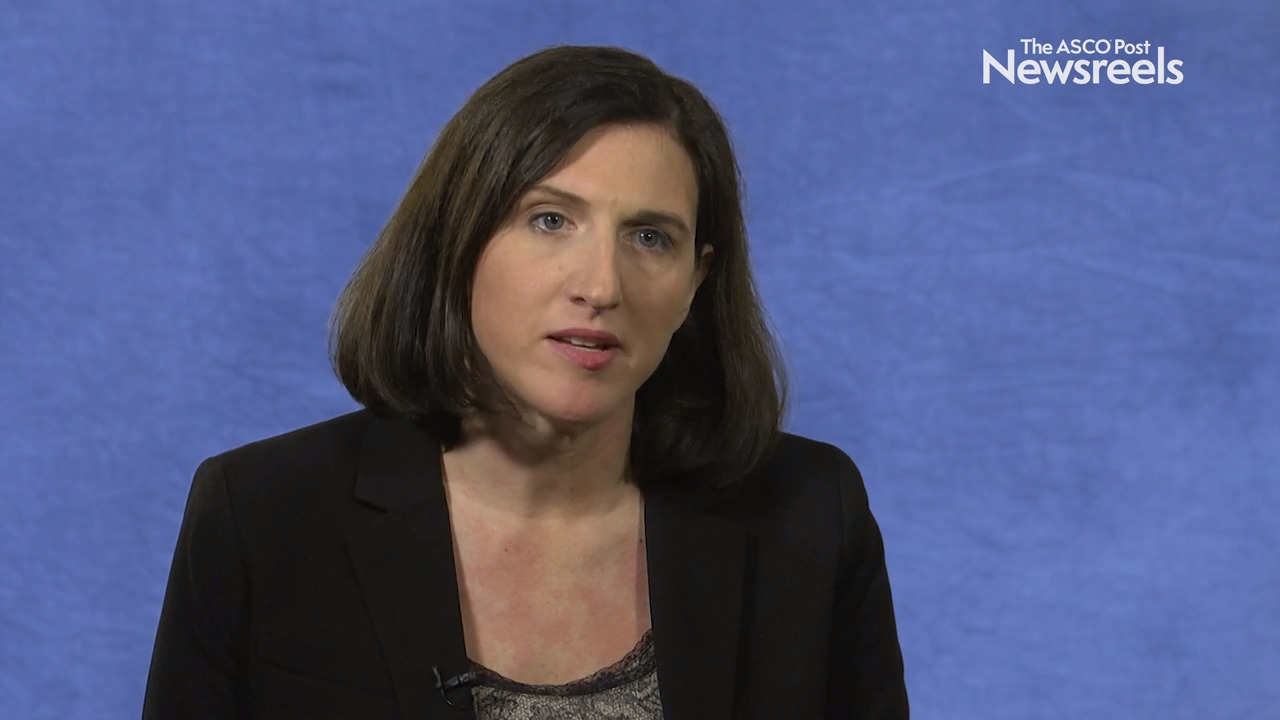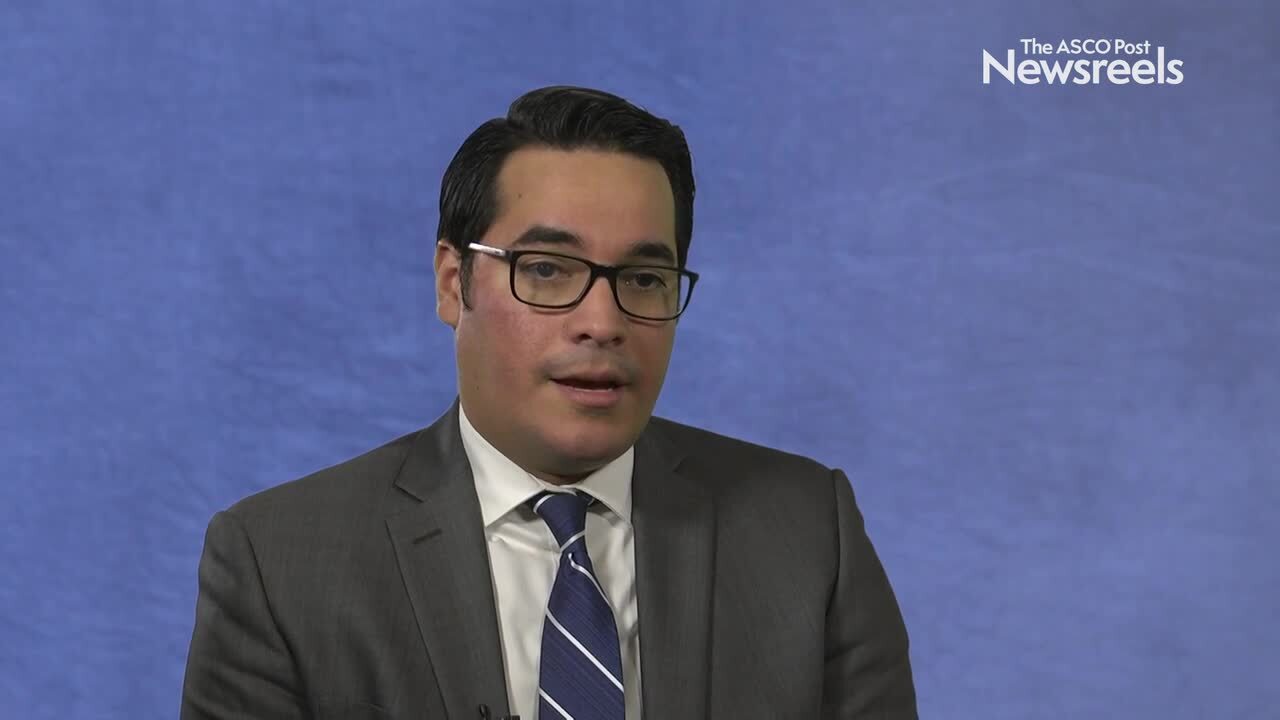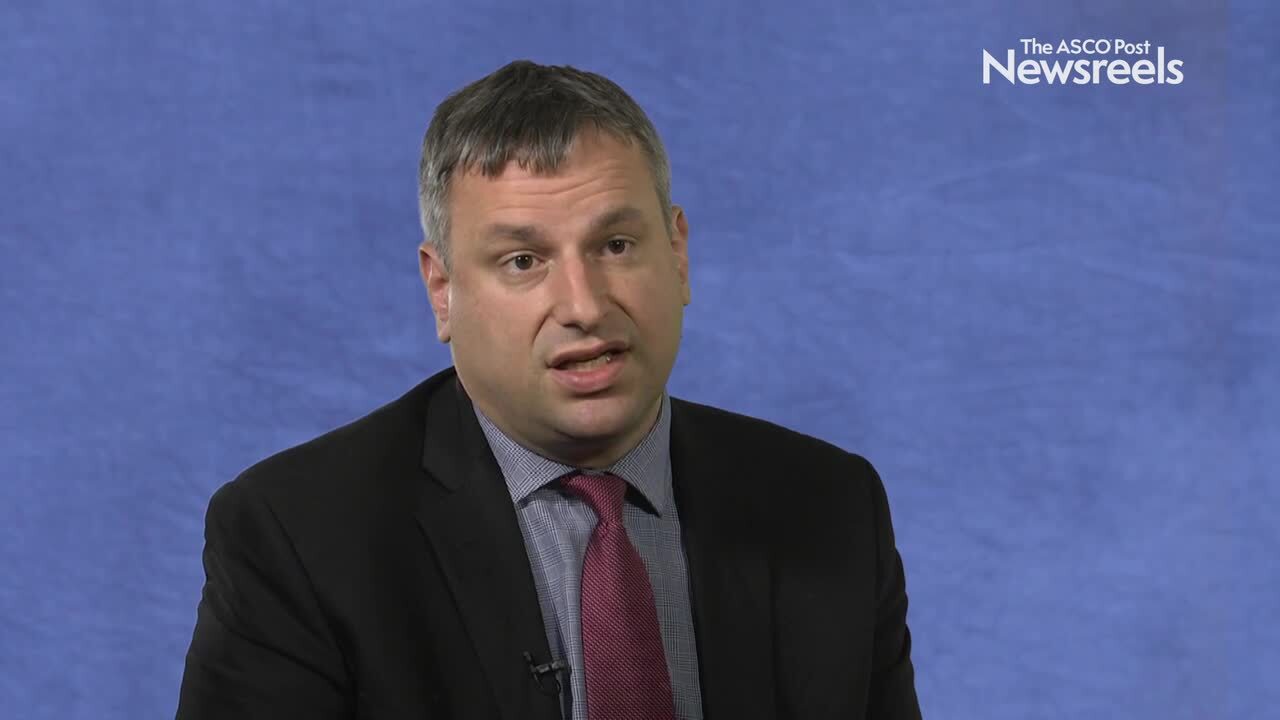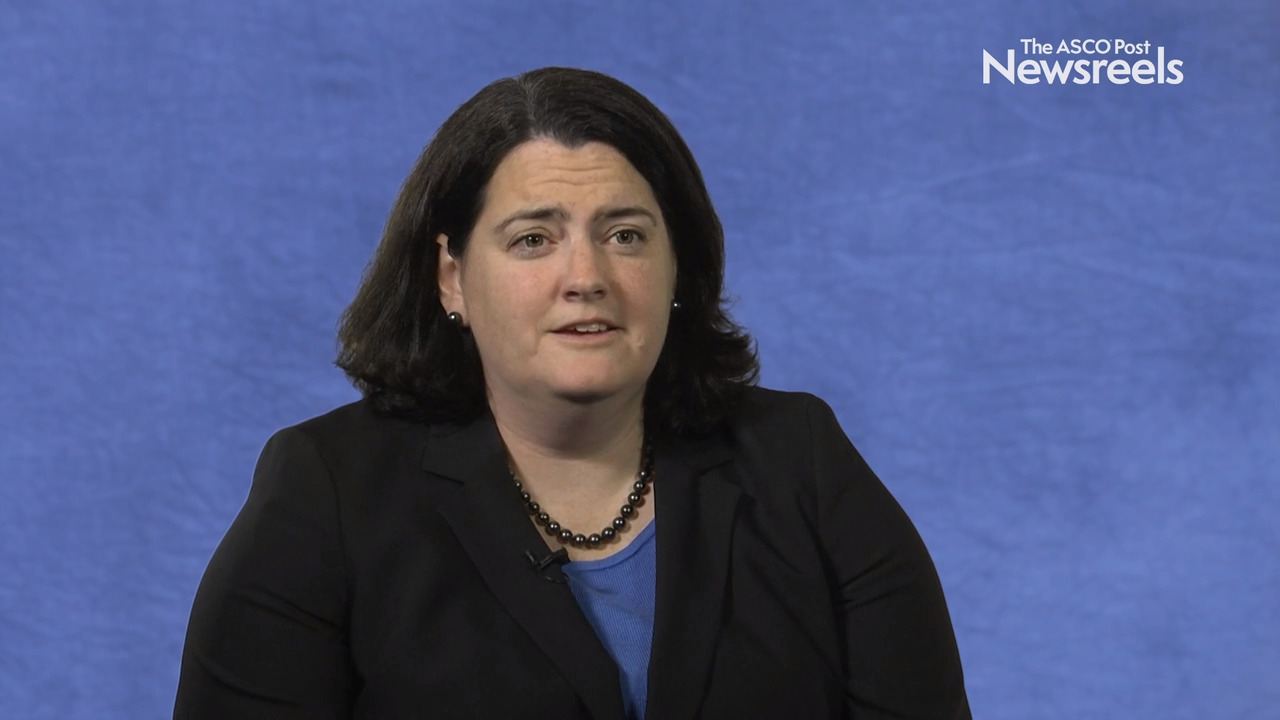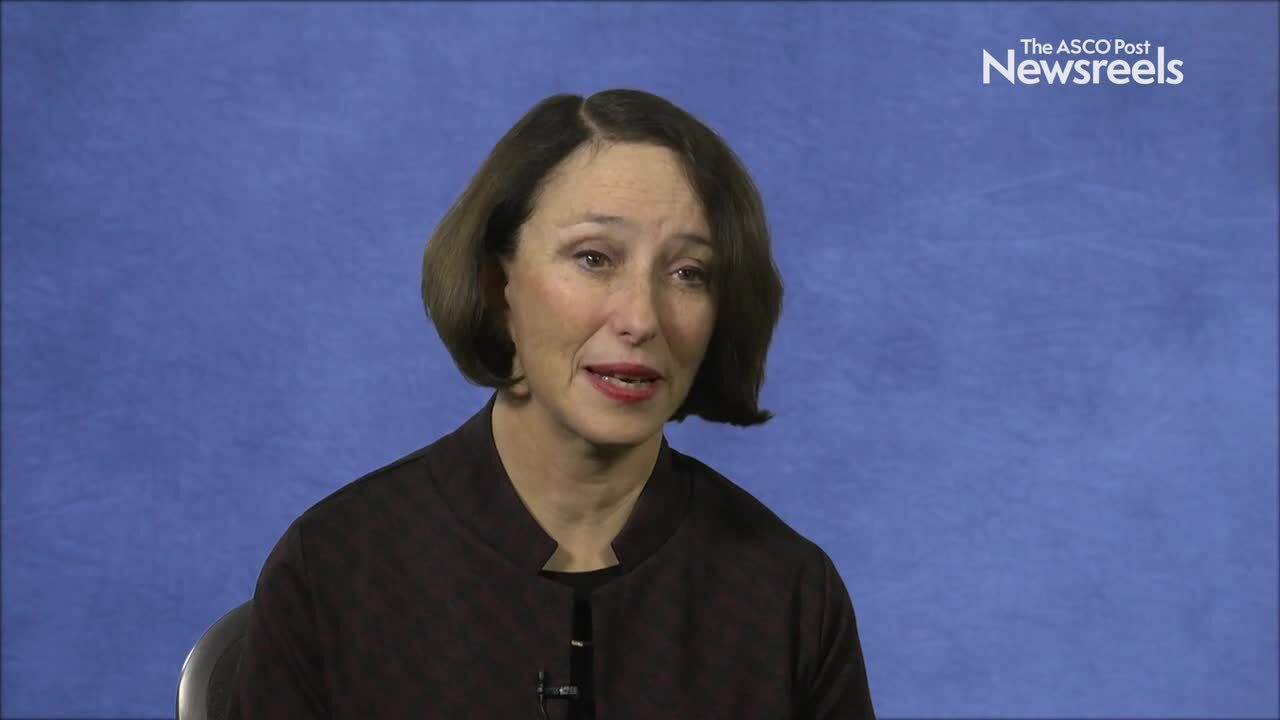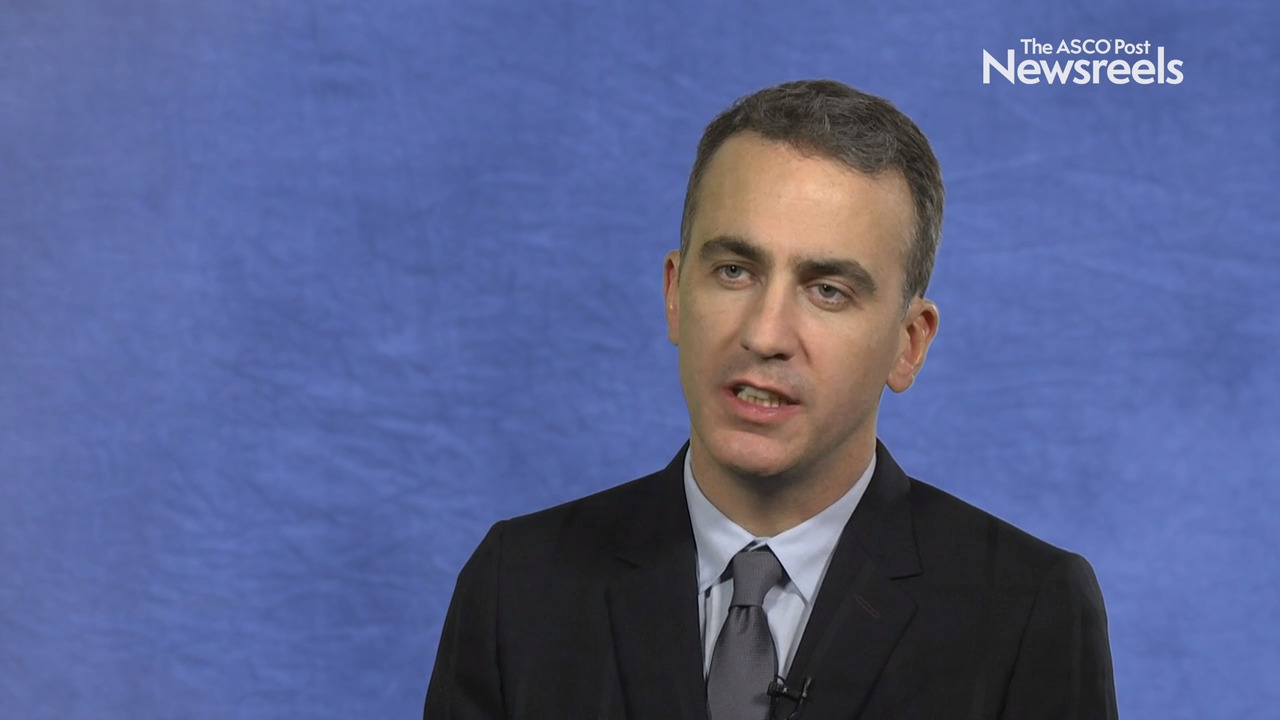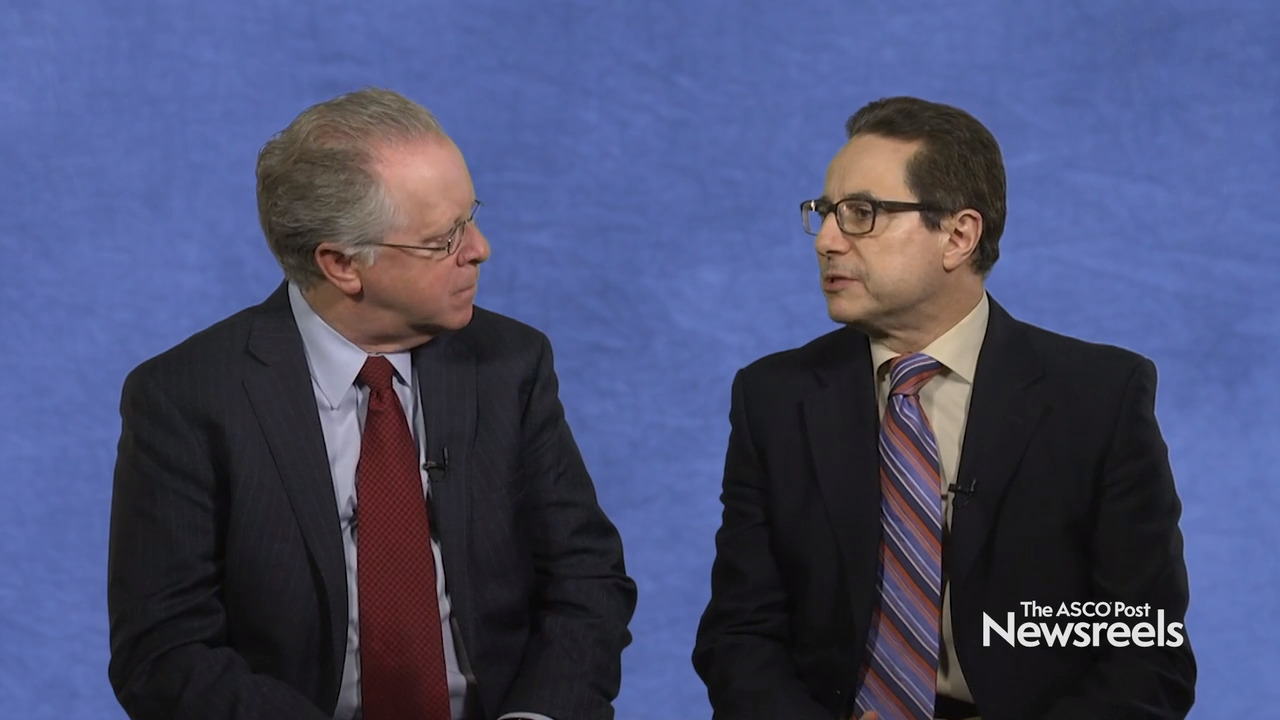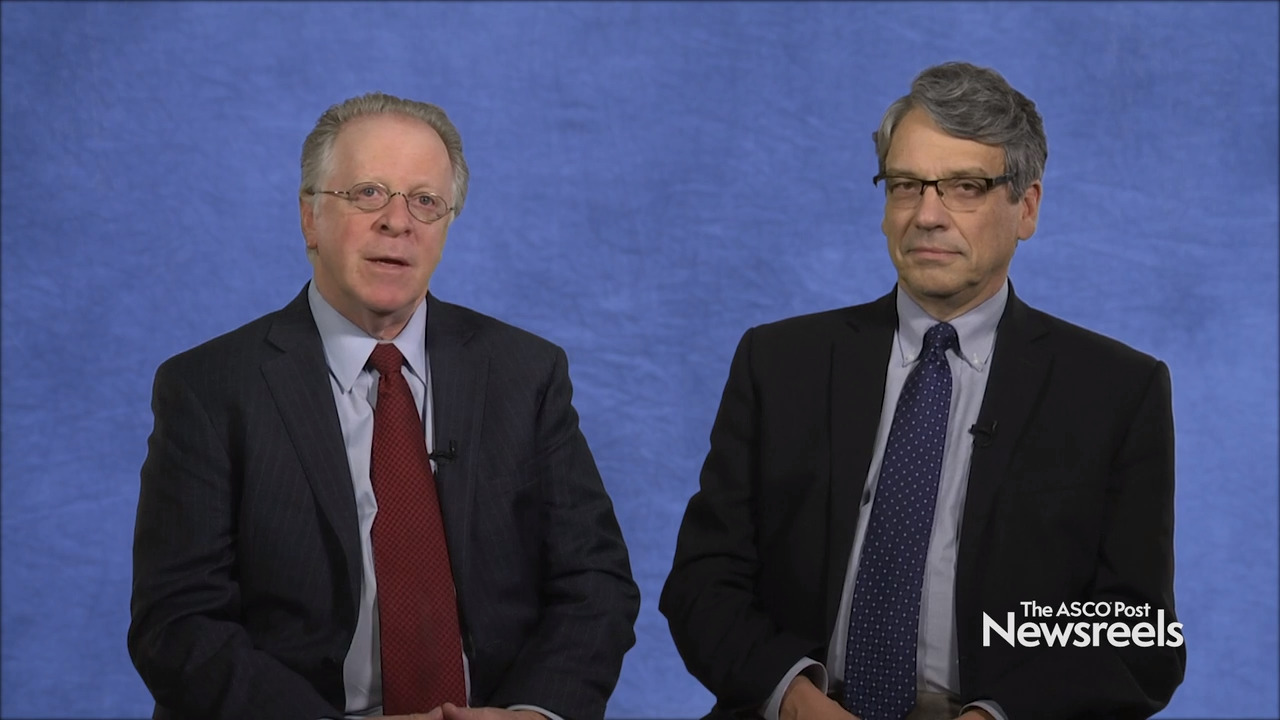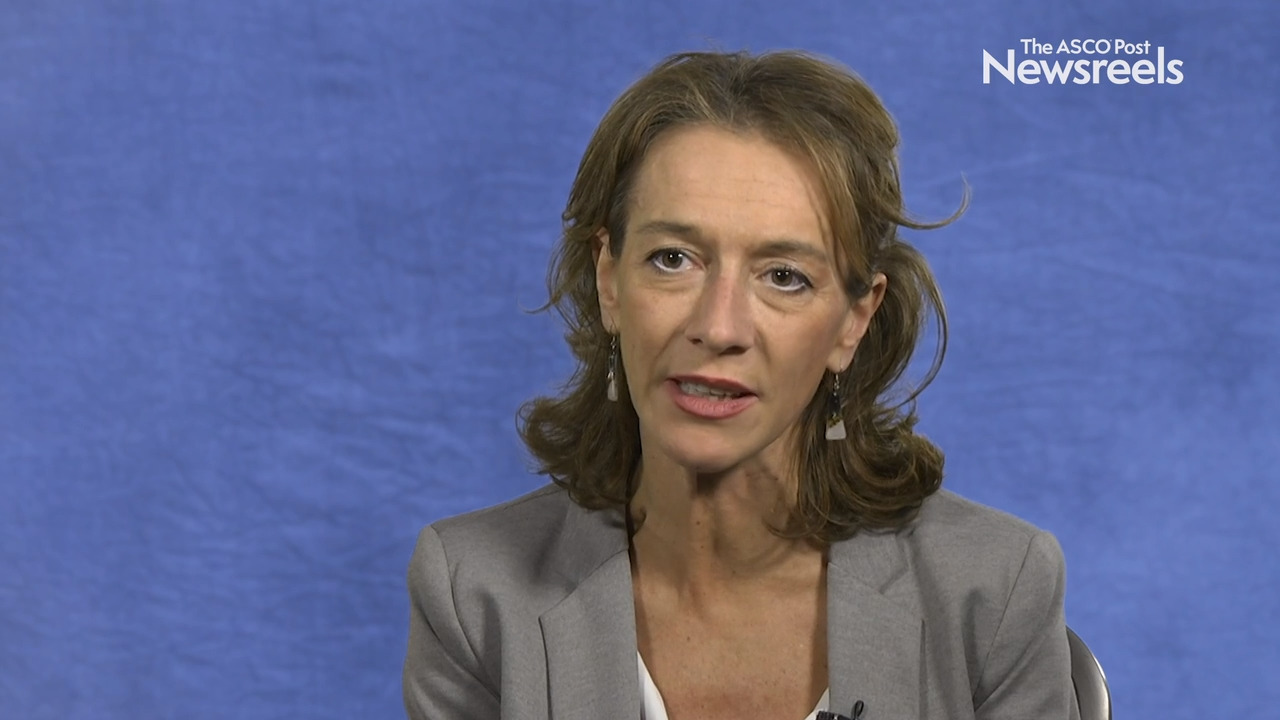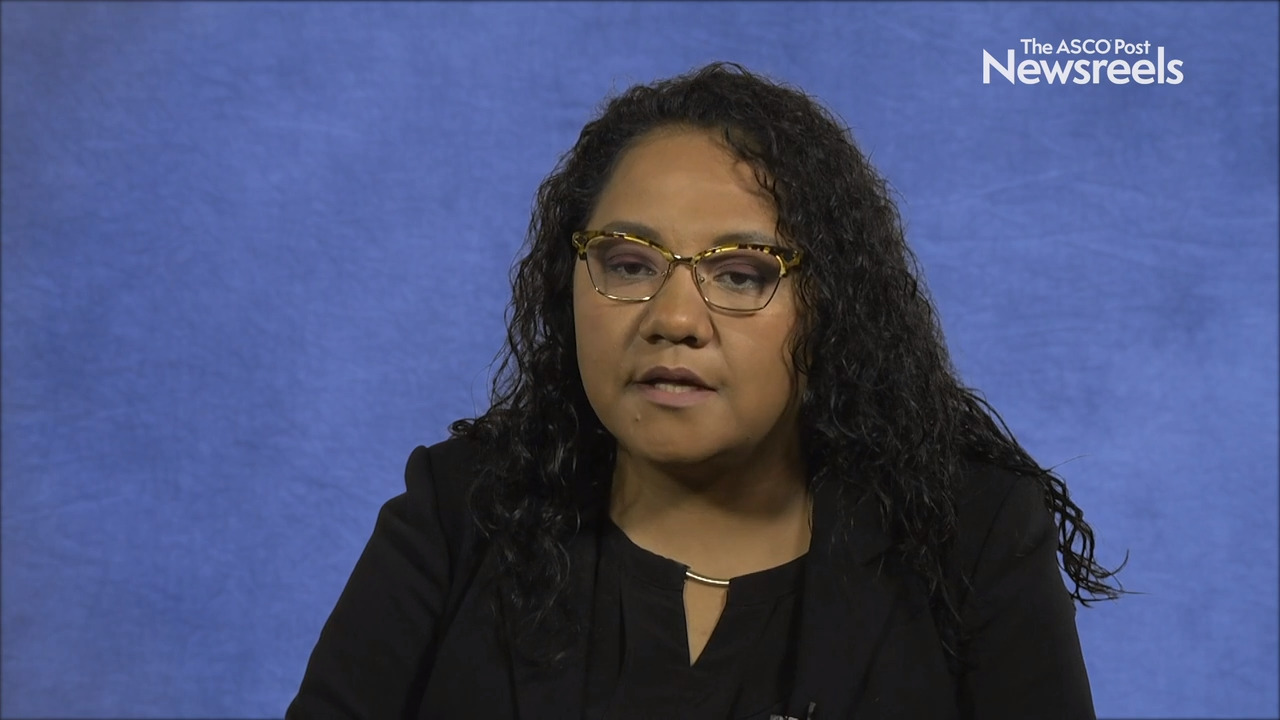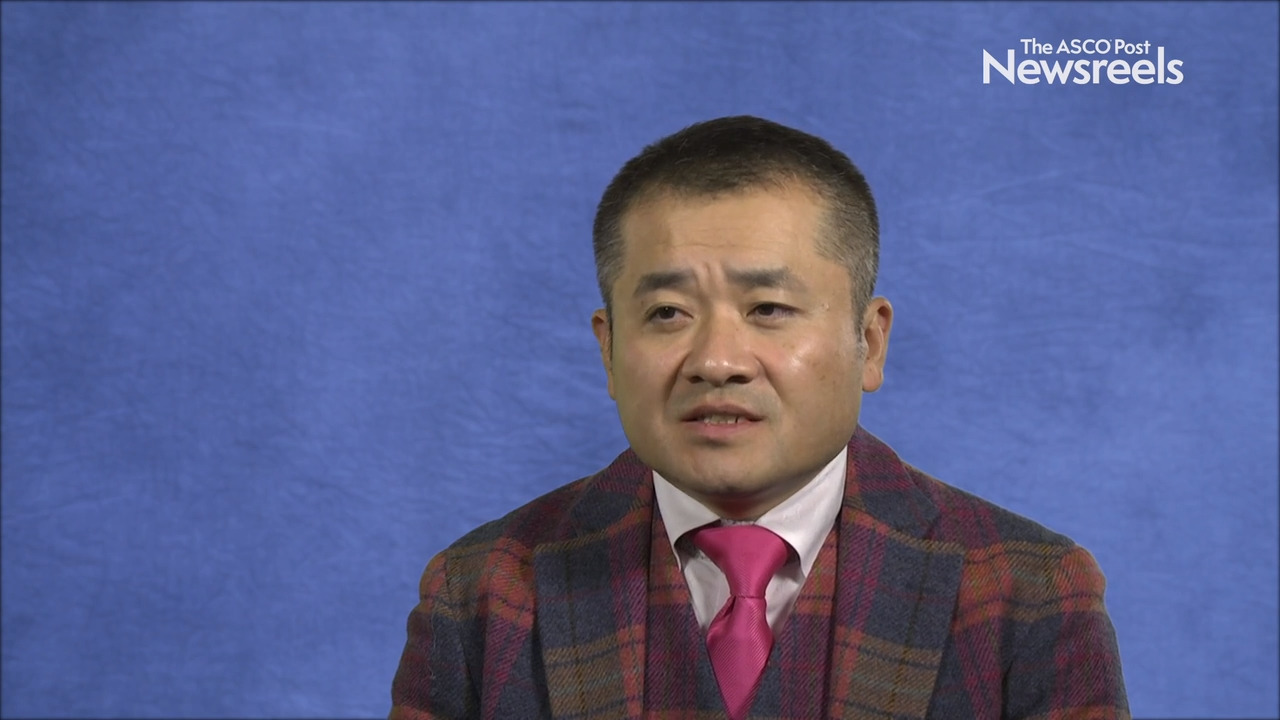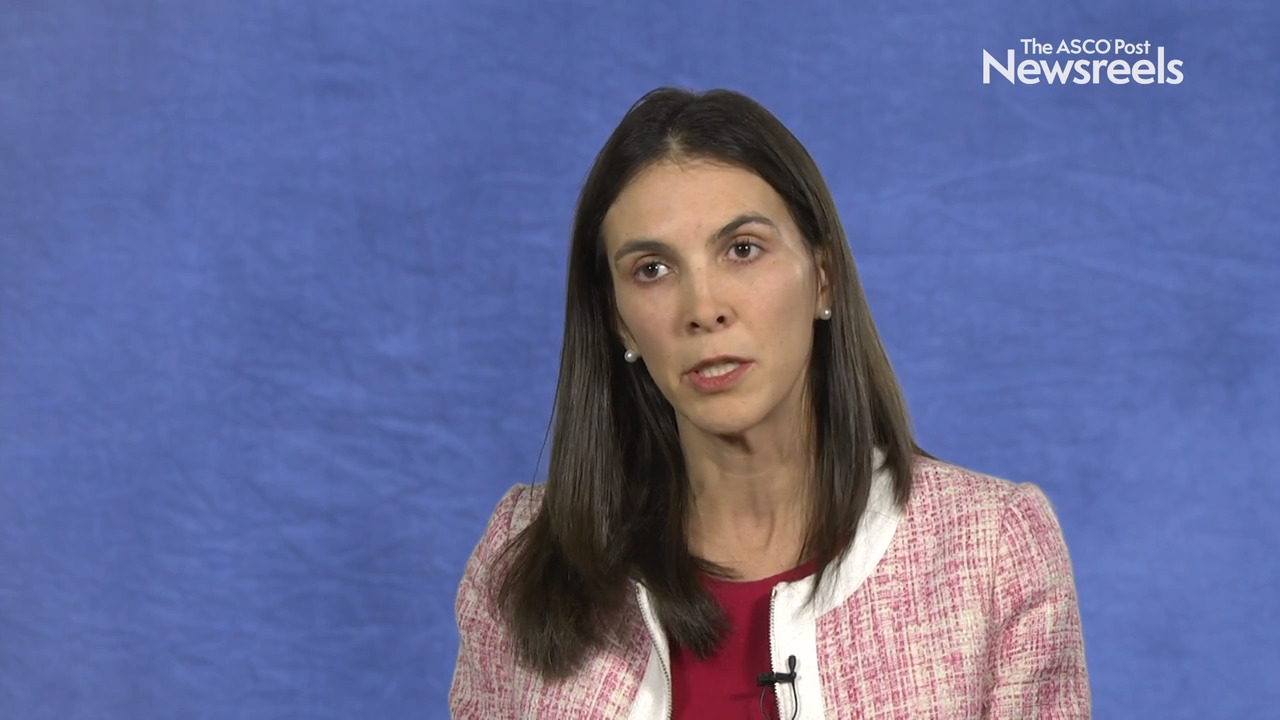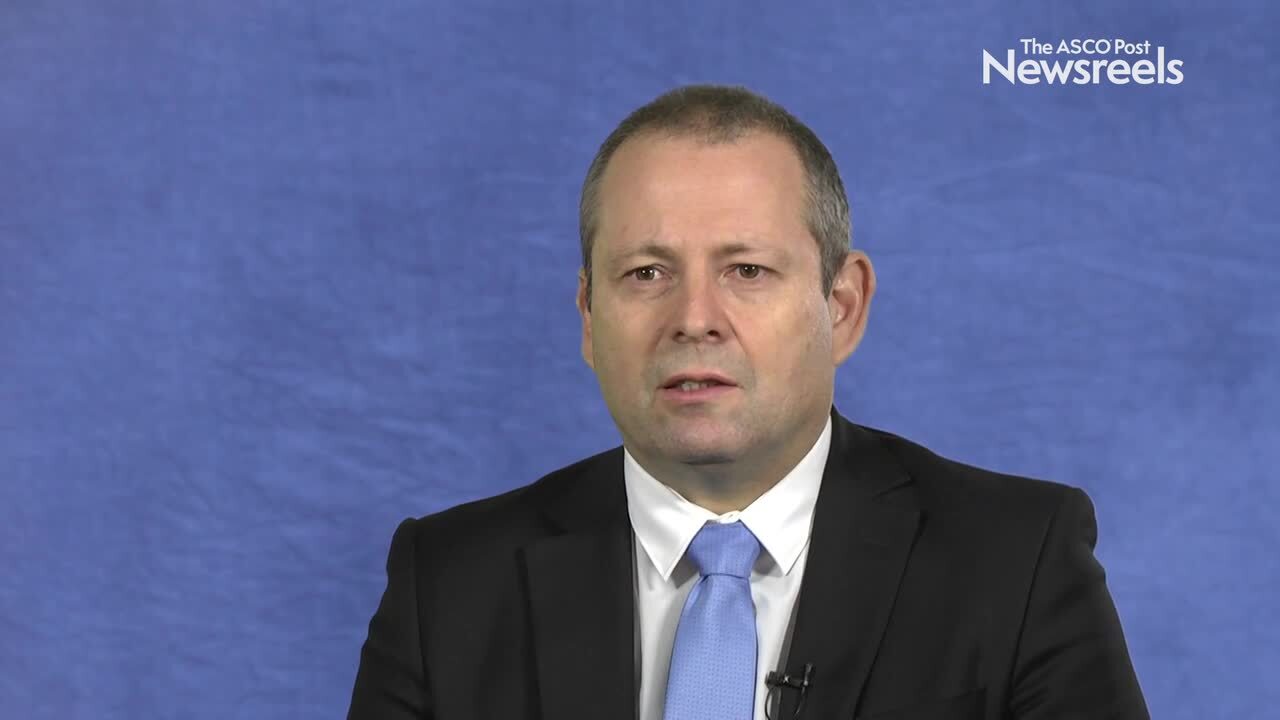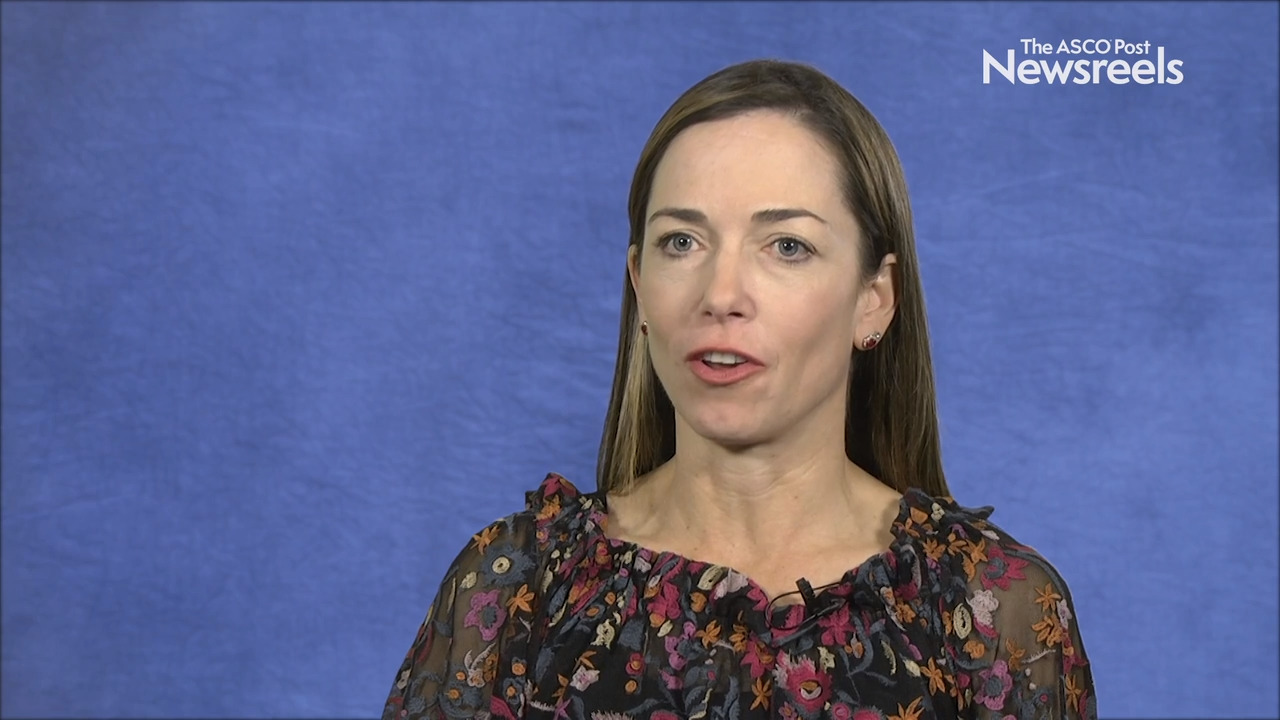RSNA 2018: Breast Cancer Risk-Based Mammography Screening in Younger Women
A new, large-scale study of more than 5 million mammograms found that annual mammography screening beginning at age 30 may benefit women with at least 1 of 3 specific risk factors: dense breasts, a personal history of breast cancer, or a family history of breast cancer. The study was presented at...
RSNA 2018: Preliminary Results of Primary Cryoablation in Treating Low-Risk Breast Cancers
Cryoablation has shown early indications of effectiveness in treating women with low-risk breast cancers, according to research presented at the Annual Meeting of the Radiological Society of North America (RSNA) (Abstract SSM01-01). “If the positive preliminary findings are maintained as the ...
Hope S. Rugo, MD, on Metastatic Breast Cancer: Treatment for Pretreated Hormone Receptor–Positive Disease
Hope S. Rugo, MD, of the University of California, San Francisco, discusses how treatment with a lower dose of palbociclib (100 mg vs 125 mg) in combination with fulvestrant or tamoxifen is associated with a lower rate of high-grade neutropenia (Abstract PD2-12).
POEMS/SWOG Intergroup S0230 Study on Preventing Early Menopause
In the long-term follow-up of the Prevention of Early Menopause Study (POEMS)/SWOG Intergroup S0230 trial reported in the Journal of the National Cancer Institute, Moore et al found that the addition of goserelin (Zoladex) to cyclophosphamide-containing chemotherapy was associated with a higher...
FDA Pipeline: New Priority Reviews, Designations, and Clearances, Plus Statements on Genetic Testing and Class Labeling
The U.S. Food and Drug Administration (FDA) recently issued the following new approvals and designations: Priority Review for Atezolizumab in Combination With Chemotherapy for the Initial Treatment of Extensive-Stage SCLC The FDA accepted a supplemental biologics license application...
Management of HER2-Positive Breast Cancer: Business as Usual?
MANAGEMENT OF HER2-positive breast cancer changed after the introduction of trastuzumab (Herceptin), the first anti-HER2 therapy to be approved by the U.S. Food and Drug Administration (FDA) for this type of cancer. Recent studies have more clearly defined the role of pertuzumab (Perjeta) and...
Expert Point of View: Rebecca Dent, MD, and Suzette Delaloge, MD, MSc
FORMAL DISCUSSANT of the ACE trial, Rebecca Dent, MD, of the National Cancer Center in Singapore, commented that the phase II ENCORE 301 study provided proof of concept that a histone deacetylase (HDAC) inhibitor can reprogram epigenetic changes.1 In that randomized, double-blind,...
HDAC Inhibitor May Overcome Endocrine Resistance in Advanced Breast Cancer
EPIGENETIC CHANGES are associated with the development of cancer, and epigenetic therapy is an attractive strategy for targeting the tumor microenvironment. One approach targeted to epigenetic changes is using histone deacetylase (HDAC) inhibition, which has antitumorigenic effects including growth ...
Shanu Modi, MD, on Low HER2-Expressing Breast Cancer: Updated Trial Findings
Shanu Modi, MD, of Memorial Sloan Kettering Cancer Center, discusses study findings from a large phase I study on trastuzumab deruxtecan in patients with low HER2-expressing breast cancer (Abstract P6-17-02).
Hope S. Rugo, MD, on Immunotherapy for Breast Cancer: Expert Perspective
Hope S. Rugo, MD, of the University of California, San Francisco, summarizes a spotlight session she chaired, which included discussion of new immunotherapy drug combinations, predictive factors, and the immune microenvironment.
Monica Morrow, MD, on View From the Trenches: What Will You do on Monday Morning?
Monica Morrow, MD, of Memorial Sloan Kettering Cancer Center reviews lessons learned from top abstracts, including how to tailor the extent of local therapy to minimize morbidity, the diminishing role of axillary lymph node dissection, long-term sequelae of breast surgical procedures, and the need to discuss outcomes with patients.
Shom Goel, MD, PhD, on Breast Cancer: Impact of CDK4/6 Inhibitors on Immunity
Shom Goel, MD, PhD, of the Dana-Farber Cancer Institute, discusses preclinical data that suggest CDK4/6 inhibitors not only stop the growth of breast cancer cells, but also enhance antitumor immunity, a phenomenon that might help improve outcomes for people with advanced disease.
Roisin M. Connolly, MD, on Breast Cancer Treatment Advances in 2018: Expert Perspective
Roisin M. Connolly, MD, of the Sidney Kimmel Comprehensive Cancer Center at Johns Hopkins, discusses clinical trials during the past year on studies on CDK and PI3K inhibitors in estrogen receptor–positive breast cancer and immune checkpoint agents in triple-negative breast cancer.
Reshma Jagsi, MD, DPhil, and Rachel A. Freedman, MD, MPH, on Over- and Undertreatment: Getting It Right
Reshma Jagsi, MD, DPhil, of the University of Michigan, and Rachel A. Freedman, MD, MPH, of Dana-Farber Cancer Institute, discuss the twin challenges of overtreating people with cancer and the missed opportunities and dangers of undertreatment.
Kathy S. Albain, MD, on Breast Cancer, Ethnicity, and Clinical Outcomes: Results From the TAILORx Trial
Kathy S. Albain, MD, of Loyola University Stritch School of Medicine, discusses study findings on race, ethnicity, and patient outcomes in hormone receptor–positive, HER2-negative, node-negative breast cancer (Abstract GS4-07).
Allison Magnuson, DO, on Older Patients With Breast Cancer: A New Tool to Help Guide Treatment Decisions
Allison Magnuson, DO, of the University of Rochester Strong Memorial Hospital, discusses the development of a chemotherapy toxicity risk score that is associated with dose reduction as well as reduced respiratory distress and fewer hospitalizations (Abstract GS6-04).
Roberto A. Leon-Ferre, MD, on Decreasing Hot Flashes: Results From an ACCRU Trial
Roberto A. Leon-Ferre, MD, of the Mayo Clinic, discusses study findings on the effectiveness of oxybutynin in decreasing the frequency and severity of hot flashes (Abstract GS6-01).
Dejan Juric, MD, on Advanced Breast Cancer: Results From the SOLAR-1 Trial
Dejan Juric, MD, of Massachusetts General Hospital, discusses phase III study findings on liquid biopsy–based assessment of PIK3CA mutational status and the combination of the selective PI3K-alpha inhibitor alpelisib plus fulvestrant in the treatment of advanced breast cancer (Abstract GS3-08).
Laura S. Dominici, MD, on Young Women With Breast Cancer: Local Therapy and Quality of Life
Laura S. Dominici, MD, of the Dana-Farber Cancer Institute, discusses the lower quality-of-life scores seen after unilateral or bilateral mastectomy compared with breast-conserving surgery in women younger than age 40 who are treated for breast cancer (Abstract GS6-05).
Judy E. Garber, MD, on Cancer Genetics: Updates for Breast Cancer Care
Judy E. Garber, MD, of the Dana-Farber Cancer Institute, summarizes a special session she moderated, which included discussion of polygenic risk scores, genetic testing in diverse populations, and what to do when presented with moderate-penetrance mutations.
Shoshana M. Rosenberg, ScD, on Quality of Life and the Impact of Breast Cancer Surgery
Shoshana M. Rosenberg, ScD, of Dana-Farber Cancer Institute, discusses her study findings on the lower quality of life associated with mastectomy, and the need for intervention and timely referrals to supportive resources, especially for underserved populations (Abstract GS6-04).
Harold J. Burstein, MD, PhD, and Daniel F. Hayes, MD, on Breast Cancer With Positive Lymph Nodes: Treatment Controversy
Harold J. Burstein, MD, PhD, of the Dana-Farber Cancer Institute, and Daniel F. Hayes, MD, of the University of Michigan Rogel Cancer Center debate whether all women with breast cancer and positive lymph nodes should receive chemotherapy.
SABCS 2018: Oxybutynin for the Management of Hot Flashes in Women Unable to Receive Hormone Replacement Treatment
Treatment with oxybutynin helped reduce the frequency and intensity of hot flashes for women who could not take hormone replacement therapy, including breast cancer survivors, according to the results of a trial presented at the 2018 San Antonio Breast Cancer Symposium by Leon-Ferre et al (Abstract ...
SABCS 2018: SOLAR-1: Liquid Biopsies in Predicting Benefit of Alpelisib in PIK3CA-Mutant Breast Cancer
Liquid biopsy–based assessment of PIK3CA mutational status served as a better indicator of progression-free survival compared with analysis of tissue biopsy in patients with breast cancer enrolled in the phase III SOLAR-1 clinical trial, according to data presented by Juric et al at the 2018...
SABCS 2018: TAILORx Results Show Association Between Clinical Outcomes in Breast Cancer and Race
An analysis of the association between clinical outcomes and race in participants enrolled in the TAILORx trial found that even with equivalent treatments among women with hormone receptor–positive, HER2-negative breast cancer, black women had worse clinical outcomes than white women, despite ...
SABCS 2018: Surgical Choice May Impact Long-Term Quality of Life in Young Adults With Breast Cancer
A study by Dominici et al investigated the long-term quality of life outcomes in young breast cancer survivors across three surgical strategies: breast-conserving surgery, unilateral mastectomy, and bilateral mastectomy. The researchers found that patients who underwent mastectomy had lower breast...
François-Clément Bidard, MD, PhD, on Metastatic Breast Cancer: Using Circulating Tumor Cells to Direct Treatment
François-Clément Bidard, MD, PhD, of the Institut Curie and the University of Versailles, discusses phase III study findings on the clinical utility of circulating tumor cell count as a tool to choose between first-line hormone therapy and chemotherapy for estrogen receptor–positive, HER2-negative metastatic breast cancer (Abstract GS3-07).
Andrew D. Seidman, MD, and Richard G. Gray, MA, MSc, on Long-Term Aromatase Inhibitor Therapy
Andrew D. Seidman, MD, of Memorial Sloan Kettering Cancer Center, and Richard G. Gray, MA, MSc, of the University of Oxford, discuss a meta-analysis of individual patient data from 12 randomized trials including 24,912 women on the effects—in terms of recurrence and cause-specific mortality—of prolonging adjuvant aromatase inhibitor therapy beyond 5 years (Abstract GS3-03).
Andrew D. Seidman, MD, and Miguel Martín, MD, PhD, on Triple-Negative Breast Cancer: Results From the CIBOMA/GEICAM Trial
Andrew D. Seidman, MD, of Memorial Sloan Kettering Cancer Center, and Miguel Martín, MD, PhD, of the Instituto de Investigacion Sanitaria Gregorio Marañón, discuss phase III study findings on adjuvant capecitabine after standard chemotherapy for people with early triple-negative breast cancer (Abstract GS2-04).
Andrew D. Seidman, MD, and Charles E. Geyer, MD, on HER2-Positive Breast Cancer: Results From the KATHERINE Trial
Andrew D. Seidman, MD, of Memorial Sloan Kettering Cancer Center, and Charles E. Geyer, MD, of Virginia Commonwealth University, discuss phase III study findings on ado-trastuzumab emtansine vs trastuzumab as adjuvant therapy in patients with early HER2-positive breast cancer with residual invasive disease after neoadjuvant chemotherapy and HER2-targeted treatment (Abstract GS1-10).
Eva M. Ciruelos, MD, PhD, on HER2-Positive Breast Cancer: Results From the PATRICIA Trial
Eva M. Ciruelos, MD, PhD, of the University Hospital 12 de Octubre and the SOLTI Group, discusses study findings on palbociclib and trastuzumab in postmenopausal patients with HER2-positive metastatic breast cancer (Abstract PD3-03).
Zaida Morante, MD, on Triple-Negative Breast Cancer: Delaying Adjuvant Chemotherapy
Zaida Morante, MD, of the Instituto Nacional de Enfermedades Neoplasicas, discusses retrospective study findings showing the importance of starting adjuvant chemotherapy for people with triple-negative breast cancer within 30 days of surgery (Abstract GS2-05).
Shoichiro Ohtani, MD, PhD, on Extending Adjuvant Aromatase Inhibitor Therapy: Phase III Trial Results
Shoichiro Ohtani, MD, PhD, of Hiroshima City Hiroshima Citizens Hospital, discusses study findings on extending anastrozole to 10 years, which led to higher rates of disease-free survival and distant disease–free survival (Abstract GS3-04).
Kathryn J. Ruddy, MD, MPH, on Breast Cancer and Quality of Life: Expert Perspective
Kathryn J. Ruddy, MD, MPH, of the Mayo Clinic, summarizes a special spotlight session that included discussion of interventions to improve quality of life and the importance of lifestyle in the prevention of cancer and cancer recurrence.
Xavier Pivot, MD, PhD, on Early Breast Cancer: Results From the PHARE Trial
Xavier Pivot, MD, PhD, of the Paul Strauss Cancer Center, discusses final study findings comparing 6 and 12 months of trastuzumab in adjuvant early breast cancer (Abstract GS2-07).
Sara A. Hurvitz, MD, on HER2-Positive Breast Cancer: Novel Treatments and Markers
Sara A. Hurvitz, MD, of the University of California, Los Angeles, discusses the natural history and novel combinations for HER2-positive disease as well as predictive and prognostic markers for this type of breast cancer.
A Diagnosis of Li-Fraumeni Syndrome Has Focused My Life Direction
Despite the fact that I had to have open heart surgery at age 7 to fix a congenital heart defect and then more surgery, chemotherapy, and radiation therapy to treat a diagnosis of rhabdomyosarcoma a year later, I never felt like I was a sick kid. Children don’t have the existential worries about...
SABCS 2018: Whole-Breast Irradiation vs Accelerated Partial-Breast Irradiation for Preventing Ipsilateral Breast Tumor Recurrence
Data from the NSABP B-39/RTOG 0413 trial indicated that ipsilateral breast tumor recurrence (IBTR) rates 10 years after treatment could not reject the hypothesis that accelerated partial-breast irradiation (PBI) after lumpectomy was inferior to whole-breast irradiation (WBI), according to a...
SABCS 2018: Low-Dose Tamoxifen in Reducing Recurrence and New Disease for Patients With Breast Intraepithelial Neoplasia
Treatment with a low dose of tamoxifen (5 mg/d), compared with placebo, decreased the risk of disease recurrence and new disease for women who had been treated with surgery following a diagnosis of breast intraepithelial neoplasia. Moreover, it did not cause more serious adverse events, according...
SABCS 2018: AMAROS Trial: 10-Year Follow-up of Axillary Radiotherapy or Surgery in Early-Stage Breast Cancer
Patients with early-stage breast cancer who had cancer detected in a sentinel lymph node biopsy had comparable 10-year recurrence and survival rates following either axillary radiotherapy or axillary lymph node dissection, according to data from the randomized, phase III AMAROS clinical trial...
SABCS 2018: Circulating Tumor Cell Count May Help Choose First-Line Treatment for Metastatic Breast Cancer
A phase III study by Bidard et al investigated whether circulating tumor cells could help physicians choose between hormone therapy or chemotherapy as front-line therapy for patients with estrogen receptor (ER)-positive, HER2-negative metastatic breast cancer. The researchers concluded that the...
SABCS 2018: Meta-analysis of Pathologic Complete Response and Outcomes in Breast Cancer
Pathologic complete response after neoadjuvant chemotherapy was associated with a significantly lower recurrence risk and higher overall survival in patients with breast cancer, and pathologic complete response after neoadjuvant chemotherapy had a similar association with improved outcomes...
Current Perspectives on the Treatment of Breast Cancer
“We are on the cusp of a new way to treat breast cancer,” Mary L. (Nora) Disis, MD, said in summarizing advances using immunology to treat breast cancer. Immune checkpoint inhibitors, adaptive T-cell therapies, and vaccines can enlist and rev up the immune system and be combined with chemotherapy...
SABCS 2018: Delayed Initiation of Adjuvant Chemotherapy Associated With Worse Outcomes in Patients With Triple-Negative Breast Cancer
A retrospective study evaluating the influence of time to chemotherapy on patients with triple-negative disease and its impact on survival outcome has found that patients who delayed adjuvant chemotherapy more than 30 days after surgery had a significantly higher risk for disease recurrence and...
Talazoparib for Germline BRCA-Mutated HER2-Negative Advanced Breast Cancer
On October 16, 2018, the poly (ADP-ribose) polymerase (PARP) inhibitor talazoparib (Talzenna) was approved for the treatment of patients with deleterious or suspected deleterious germline BRCA-mutated, HER2-negative locally advanced or metastatic breast cancer.1,2 Patients must be selected for...
SABCS 2018: Does Adjuvant Capecitabine Improve Outcomes in Early-Stage Triple-Negative Breast Cancer?
Treating patients with early-stage triple-negative breast cancer with capecitabine after surgery and standard chemotherapy did not significantly improve disease-free or overall survival compared with observation, according to data from the randomized, phase III GEICAM/CIBOMA clinical trial...
SABCS 2018: KATHERINE Trial: Adjuvant Ado-Trastuzumab Emtansine vs Trastuzumab in Early-Stage HER2-Positive Breast Cancer
The phase III KATHERINE clinical trial compared the use of ado-trastuzumab emtansine (T-DM1; Kadcyla) vs trastuzumab (Herceptin) as adjuvant therapy in patients with HER2-positive early-stage breast cancer with residual invasive disease after receiving neoadjuvant chemotherapy and...
Discontinuation of Follow-up Care Among Women With Early-Stage Breast Cancer
In a study using linked Surveillance, Epidemiology, and End Results (SEER)-Medicare data reported in the Journal of Oncology Practice, Quyyumi et al found that 21% of women with early-stage breast cancer discontinued follow-up care within 5 years after diagnosis. Study Details The study involved...
EORTC-NCI-AACR: Genomic Testing in Breast Cancer May Enhance Personalized Treatment: Update of I-SPY 2
New results from the long-running I-SPY 2 trial, which aimed to identify which new drugs or combinations of drugs are most effective in which types of breast cancer, demonstrated the usefulness of two genomic tests. Laura van ‘t Veer, PhD, leader of the Breast Oncology Program at the...
ADVISE PATIENTS ABOUT THE IMPLICATIONS OF RACIAL DISPARITIES FOR BREAST CANCER SCREENING
“BLACK WOMEN are more likely to develop breast cancer at a younger age, compared with white American women, and at all ages, younger and older individuals are more likely to develop triple-negative breast cancers,” Lisa A. Newman, MD, MPH, told The ASCO Post. “So, I think it is very clear that if...
